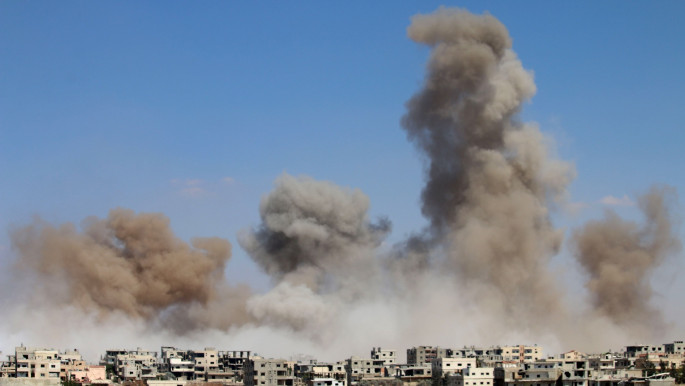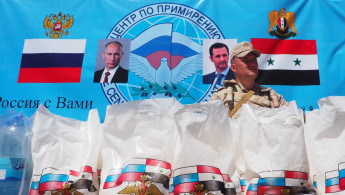In its battle for influence, Russia's soft power strategy seeks to reshape Syria's future
Not only are there areas of fighting in the south, east, and northeast, but a cycle of violence in northwestern and northern parts of the country could erupt at any moment.
Syria today is divided informally and de facto into zones of influence between the main players of Russia, Iran, and Turkey. The Syrian regime itself also has reasons to worry; the economic situation in the areas it controls could be a major cause of future problems for Assad from his own supporters.
Of these three major players, Iran and Russia have a significant advantage in Syria, intervening strongly in support of Assad. While the US still has a peripheral involvement in the conflict through its support for the Syrian Democratic Forces (SDF), Tehran and Moscow remain hegemons in the area.
Even Turkey, which has taken serious steps in the last five years to establish zones of influence from the Caucasus through Syria to Libya, does not exert the same influence as the Kremlin or Iran.
Iran and Russia are yet to enter a direct confrontation but covert tensions have already begun through proxies and veiled threats in the battle to influence Assad and Syria as a whole. The war in Syria is not over, it simply continues through local tensions in the context of the wider conflict, and Russia intends to be prepared.
Soft power
Moscow's role in Syria is often referenced through its military strength, the intervention in favour of Assad in 2015, or Russia's economic interests. The battle for the economic heart of Syria - Aleppo - culminated in the capture of the entire area by regime forces in 2016, with subsequent agreements with rebels in 2017-2018, signed at the barrel of a gun, further cementing Russia's involvement in the conflict.
 |
Russia does not have short-term interests in Syria and the Middle East. Quite the contrary; Moscow's efforts are related to establishing a lasting presence |  |
But Syria is much more important to the Kremlin. It was Syria that became the main base for Russian mercenaries, who moved from Ukraine to the Middle East and later from Syria to Africa. It was in Syria that the Kremlin raised its image as the protector of the international order after the events in Ukraine in 2014. And it was Syria that became a testing ground not only for weapons but also for hybrid operations. While Moscow carried out the de facto intervention in 2015, its influence in the region dates back much longer and this is due to its so-called soft power, the instruments of which are being applied diligently in Syria today.
While the Kremlin handed out medals to pro-Assad militias in Christian towns at the beginning of this year to show its commitment to Orthodox Christians and, in general, to promote its image as a defender of minorities, Russia has many more tools to apply in the battle for the hearts and minds of Syrians.
 |
|
| The cradle of Syria's revolution: Daraa ten years on |
One such example is the semi-official Military Police, loosely part of the regular armed forces of the Russian Federation. Formed in 2011, this corps quickly gained strength and a few years later numbered 20,000 people. They were deployed so often by the Russian command that the red berets and black ribbons of its members would become known far beyond Syria.
Under the leadership of Lieutenant General Vladimir Ivanovski, head of the General Directorate of Military Police at the Ministry of Defence, their effectiveness is the subject of public debate. But as their role in Syria shows, they represent a different face of the Russian military and a tool for soft power.
Fighters from this military unit were first stationed in Syria in December 2016. The core of the Military Police is made up of Chechens known as the Kadyrovtsy (i.e., the men of Kadyrov), a paramilitary group loyal to Chechen leader and Putin's political ally Ramzan Kadyrov. The Kadyrovtsy appeared in 1994 during the time of his father Ahmad Kadyrov, when they were a separatist militia fighting Russian forces in the First Chechen War.
When Kadyrov turned the country around and sided with Russia in 1999 during the Second Chechen War, the role of the Kadyrovtsy also changed. In the years that followed, they transformed from a combat unit responsible for defending the Chechen leader into a military force with many powers. When Ramzan Kadyrov came to power, these fighters became his 'private army.'
 |
Humanitarian aid is a tool of soft power being applied successfully in Syria, often funded by charities linked to Russia's political elite |  |
It is not clear how many members of Russia's Military police were initially stationed in Syria. Chechens have a variety of roles, from guarding military convoys to conducting humanitarian aid campaigns in Aleppo, another very visible tool of Russia's soft power. Like the Soviet Muslim battalion during the Afghanistan war in the 1970s, the Kadyrovtsy were used on the Syrian front lines as Muslims, and there are large Caucasian communities in northern Syria dating back to the Ottoman era.
Many Syrian Circassians and Chechens are opposed to the Assad regime, and one of the main goals of the Military Police sent by Russia is to gain the trust of as many of them as possible. Later, the Chechens received fresh forces from the Republic of Ingushetia. The Ingush guard an important Russian base in Syria, Hmeimim, and fight alongside regime forces in Damascus.
The use of the Military Police in Syria is the first deployment of such a force outside of the Russian Federation. This experiment was successful, as evident in the provinces of Hama and Idlib, where in 2019 fighters from the unit were seen on the front lines. Military police were stationed in post-2016 Aleppo, on the streets of Damascus and in cities in northern Syria. With the simultaneous deployment of special forces and Wagner mercenaries, Chechen troops have become a key element in implementing a "post-conflict" strategy to win over the local population in Syria.
 |
|
| Moscow's mercenaries: How Russia is swelling the global market for private military companies |
The next generation
Humanitarian aid is also a tool of soft power being applied successfully in Syria, often in combination with other strategies. For example, humanitarian aid convoys are guarded by units sponsored by strongmen close to Putin, and humanitarian aid itself is provided by a network of organisations such as the Imperial Orthodox Palestine Society, RUSSAR Charitable Fund, the Combat Brotherhood (a nation-wide veteran organisation), and the Committee for Solidarity with Libyan and Syrian People.
All of these structures zero in and focus part of their foreign activities on the next generation of young Syrians. The younger generation is a prime propaganda target, as this vulnerable segment of the Syrian population can be heavily influenced and successfully co-opted into the wider Russian strategic influence architecture in the Middle East.
One such charity is RUSSAR headed by Oleg Fomin, a seasoned former diplomat who was the director of the Soviet cultural centre in Syria from 1969 to 1975 and representative of the Russian centre for international scientific and cultural liaisons in Tunisia and Egypt from 1994 to 2006.
 |
While the use of hard military power and local paramilitary structures are important strategic elements, the most crucial element from a strategic long-term perspective is maintaining a tight grip over the youth |  |
The organisation is connected to the Russian political elite via its board. This includes the former deputy chair of the Duma, the lower chamber of the Russian Parliament, Sergey Baburin; the former Russian ex-ambassador to Syria Alexander Zotov; and the humanitarian projects coordinator of the Combat Brotherhood Nelly Kuskova. RUSSAR's main financial backing is from brothers Mudallal and Imad Khouri, dual Russian-Syrian nationals who incidentally have been linked to the company that bought explosive materials that entered Beirut's port in 2013 and fuelled a massive explosion in August 2020.
RUSSAR became a primer for a special-purpose soft power instrument, with cooperation between all major stakeholders of Russian foreign policy, such as the so-called siloviki (i.e., the security services), the Orthodox faction of devoted oligarchs, and the old-school Soviet diplomats and spies with links to the current elites in the Middle East and other regions.
 |
|
| Syria Insight: Fears for Syrian refugees in Denmark after government classifies Damascus as 'safe area' |
As a tool of influence, RUSSAR has a special focus on projects involving young people and intellectuals, as it aims to shape the future civilian and military Syrian elite. It stays close to important sources of local information that augments intelligence-gathering efforts, seeking returns on a long-term investment strategy under the veil of humanitarian aid provision, veterans' family's assistance, and the defence of Christian heritage in Syria.
Another signature method associated with these charities to indoctrinate and spread myths is the establishment and historical recycling of so-called youth camps for patriotic education, based on the Soviet tradition, and the process of ever-growing militarisation of children and youth in Putin's Russia.
These camps also provide the perfect opportunity to indoctrinate, shape and mould the future "defenders of the Russkiy mir," or 'Russianness', while bonding them with their peers from the so-called Novorossiya, such as Belarus, South Ossetia, Abkhazia, and Syria.
These camps serve the purpose of indoctrinating the next generation of Putin's version of loyalists, in a peculiar program of winning hearts and minds at an early age. This program is just a partial reflection of the fact that Russia does not have short-term interests in Syria and the Middle East.
Quite the contrary; Moscow's efforts are related to establishing a lasting presence and expanding the so-called "Russian World", which so far covers Eastern Europe and parts of Central Asia. As with other regions, where he looked to examples from the Russian Empire, Putin sees the Middle East as a natural extension of Russian interests.
 |
It is a matter of time and strategy for Moscow to acquire a loyal elite that will bring a stable Kremlin presence in Syria, which Putin has wanted since the beginning of the intervention |  |
Not everything is certain for Russia in Syria, as there are still a number of representatives of the economic, military, and political elite of the Assad regime who are not ready to fully commit to the Kremlin. Iran also has serious influence. While the use of hard military power, mercenaries, such as the infamous Wagner Group, and the maintenance of local paramilitary structures are important strategic elements, the most crucial element from a long-term influence perspective is maintaining a tight grip over the youth, who represent the next generation of elites in their respective countries, including Syria.
In September 2018, the first group of Syrian youths arrived in St. Petersburg to begin their studies in Russian military schools. The training took place within the framework of agreements previously signed by Moscow and Damascus, and the recruitment of Syrian youths to the Russian cadet corps will be carried out annually. It is a matter of time and strategy for Moscow to acquire a loyal elite that will bring a stable Kremlin presence in Syria, which Putin has wanted since the beginning of the intervention. So far, there is no other regional power to stop this from happening.
Ruslan Trad is the author of 'The Murder of a Revolution' and co-author of 'The Russian Invisible Armies'. His journalistic work is focused on PMCs, Syria, and conflict zones. Follow him on Twitter: @ruslantrad



